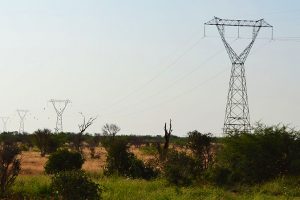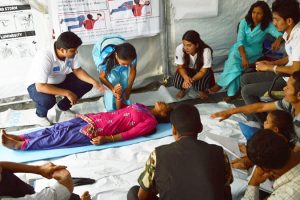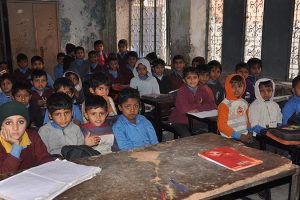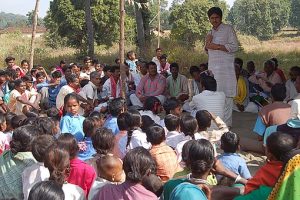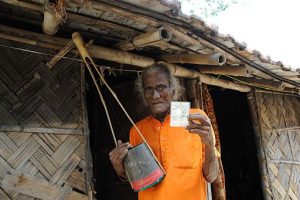Public Service Delivery
Institutional Diagnostic Synthesis
The Institutional Diagnostic synthesis is the culmination of the research undertaken in the four EDI case studies in Bangladesh, Benin, Mozambique and Tanzania. The synthesis also reflects on two historical case studies – Taiwan and South Korea – and describes…
Using Digital Trails to Improve Management and Accountability for Public Service Delivery
Issue: Delays in receiving wage payments reduce poor rural households’ ability to manage economic uncertainty and meet their subsistence needs. This is a particularly dire concern for the 50 million impoverished rural households who rely on the payments from India’s…
Randomized Inspections and Information Campaigns
Randomized Inspections and Information Campaigns: Impact on Compliance to the use of Electronic Fiscal Devices (EFDs) in Tanzania Issue: Governments across East Africa mandate that businesses use electronic fiscal devices (EFDs) to increase VAT tax compliance. These devices directly transmit…
Teacher rotation and student outcomes: Experimental evidence from Uganda
Focus of the study Can formal and informal institutions be leveraged to build human capital? Uganda’s education system is plagued by low personnel morale, low engagement and high absenteeism (estimated at 27%) among teachers. We propose to transform state-mandated transfers…
Gangs of Medellin: variation in non-state provision of order and justice
Issue Urban armed groups, especially criminal gangs, are a growing threat to peace and economic growth in cities across the world, and often exert state-like powers such as enforcing contracts, policing, and taxing businesses. Gangs, mafias, and urban militias have…
The Political Economy and Governance of Rural Electrification
Issue: Many developing country governments lack the capacity to directly implement large infrastructure and service delivery projects, instead hiring private contractors to perform public sector responsibilities: at 14.5% of GDP, low-income countries have the highest share of public procurement in…
The strategic game between autocratic power, the military and the clerics
Focus of the study The purpose of this project is to develop a theoretical model that captures the interactions between civic, military and religious powers in the context of weakly institutionalized societies characterized by a high degree of religiosity. Our…
Social structures, political accountability, and effective public goods provision
Focus of the study This project explores the extent to which age sets, a traditional social structure in many African societies, can be leveraged to improve local oversight, governance, and the provision of public goods. Age sets are initiation rituals…
Combatting caste- and gender-based discrimination in the healthcare and education sector
Customizing incentives to combat caste- and gender-based discrimination in the healthcare and education sector (Nepal and India) Focus of the study Inequities in access as well as quality of healthcare and education are a major challenge facing developing economies. Anecdotal…
Training for productivity: An experimental evaluation of civil service reform in Ghana
Focus of the study Our central research question is: “Does training bureaucrats in productivity techniques improve management and productivity in Ghana’s Civil Service?” This project aims to improve the Ghanaian Civil Service’s productivity by designing, implementing and evaluating novel individual…
Monitoring the Performance of Agents in Public Service Delivery
Issue: India’s state-run electricity distribution companies (discoms) often lose up to half of the power they are supposed to supply to customers to theft, losses and non-payment. Despite these inefficiencies and corruption, electricity distribution cannot be wholly privatized to improve…
Beyond the Paycheck – Motivational tools for public school teachers
Issue: The performance of frontline public sector workers is a significant problem in developing countries where low attendance and effort limit the value of service delivery, thereby diminishing well-being and economic development. Poor performance of public school teachers remains a…
Performance-Based Incentives in Multi-Layered Organizations
Performance-Based Incentives in Multi-Layered Organizations: Evidence from Sierra Leonean Community Health Workers Issue: Access to adequate healthcare remains a key challenge in many developing countries. This is particularly true in rural villages of Sierra Leone, where access to health facilities…
Training Politicians to Better Serve
Issue: India, a developing country with a strong and vibrant democracy, exhibits many elements of weak institutions and associated problems of ineffective governance. Both state and national legislatures are characterized by high levels of corruption, criminality, and poor performance. At…
Can Transparency Improve Preferences and Norms in the Public Sector?
Issue: Political norms and citizen preferences could be key enablers of the poor quality of public services in developing countries. Politicians may, for example, deprioritize public service delivery improvements because citizens prefer elected officials that offer them private benefits, including government jobs or…
Recruitment, Effort, and Retention Effects of Performance Contracts for Civil Servants
Drawing on experimental evidence from Rwanda primary schools Issue: Skilled and intrinsically motivated public sector employees are critical to state capacity and the provision of key services, including education. Yet the capability to recruit, motivate, and retain this profile of civil servants…
Bottom-Up Transparency Initiatives to Reduce Corruption
Issue: Transparency interventions frequently rely on a top-down approach in which a policymaker or external entity demands information about activity in a particular sector. Bottom-up transparency interventions differ by offering citizens the opportunity to directly initiate efforts to improve public goods or services….
Governance Capacity and Political Selection
Issue: The digitization of key government services — in this case, India’s National Rural Employment Guarantee Scheme — can streamline public service delivery and reduce the ability of politicians to misappropriate state funds. Political officials face challenges if they lack sufficient…
Community Policing and Public Trust: A Field Experiment in Uganda
Issue: Use of excessive force has diminished trust between citizens and law enforcement in many parts of Uganda. In an effort to improve this dynamic, the state is revisiting a “homegrown” model of community-policing that increases police presence through local patrols and community…
Reforming Police Practices in India
Issue: The Indian state of Madhya Pradesh’s police force has a low officer to citizen ratio with multiple vacant positions, and a lack of representation of women in their ranks. Efforts have begun to make police forces more public-oriented, but…





